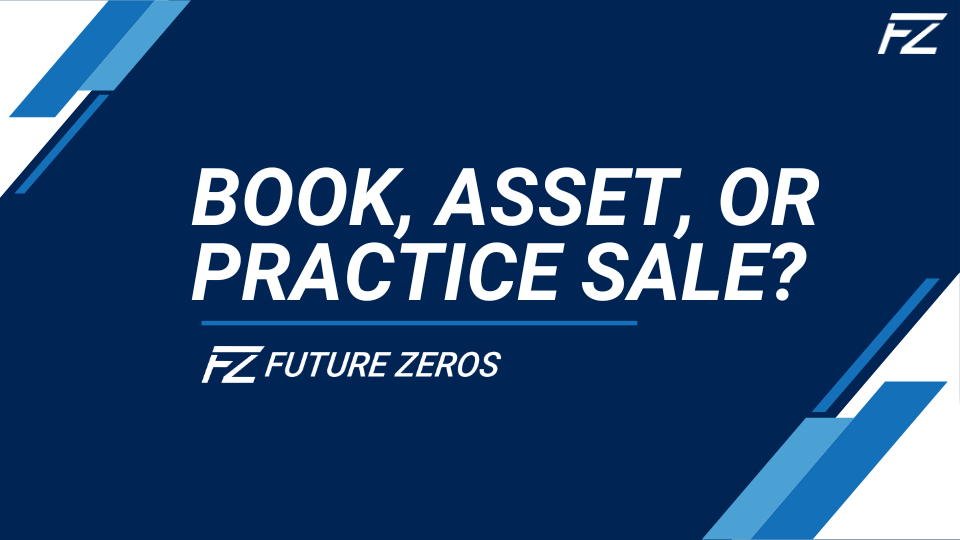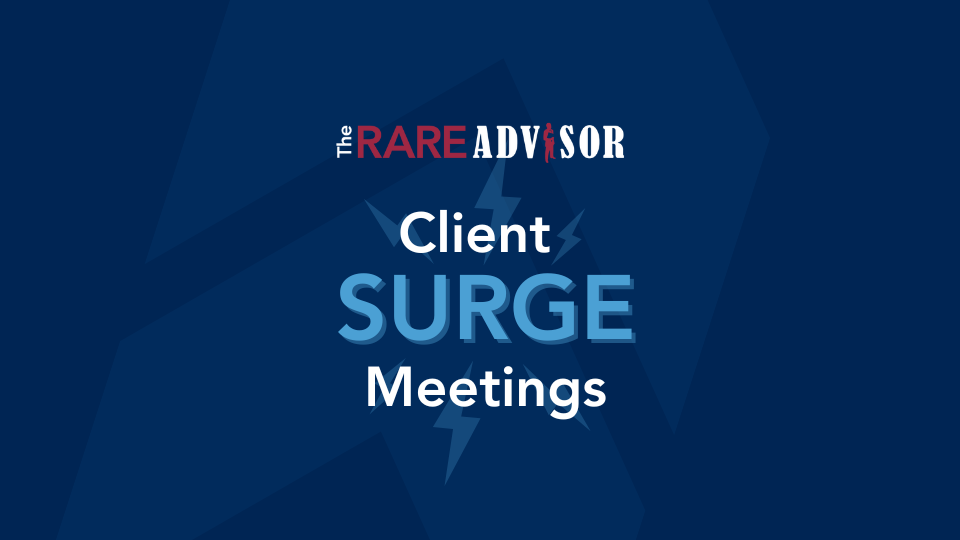Book, Asset, or Practice Sale?

What is the difference between selling/buying a book of business, selling/buying a financial practice, and selling/buying the assets of a business? If you don’t know the difference between these before walking into an M+A negotiation, you’re at a huge disadvantage. In this episode of Future Zeros, we’ll dive into each option and when it may be a good fit for you.
When you're buying or selling a financial advisory practice how do you know if you should be talking about buying or selling the book, buying or selling the assets, or buying or selling the practice? They're actually three very different things, and depending on what you're trying to accomplish, you want one over the other.
If I'm running a viable financial advisory practice and I'm trying to buy the advisor on the other side of town, and I really don't need anything other than the block of business, then I'm trying to buy the book. That's all I want. I probably don't want all that extra overhead. I might not even need the other office site or location, and so on. But I'm going to merge it into mine. I'm not going to run it as a separately branded practice. So I probably want to buy the book.
Then, on the other hand, maybe I want to buy the assets. So not just the book, but I want to buy the assets. Well, what does that mean? Well, maybe it means that I want some of the stuff they have, besides just the book or the block of business, but I don't want all of it. Maybe I want to retain a couple of key service employees. Maybe I am actually interested in the location, but I don't want their equipment, because I'm going to meld them into my phone system, into my network system, the CRM and other technology components, and everything else that goes along with that. Maybe I'm going to piggyback all of that, but I don't really want to buy the entire practice. I just want some sub-pieces of it. So I want to buy those assets, which is bigger than buying the book, but still not buying the whole practice.
Maybe I'm going to buy the entire practice, meaning the ongoing value of it as a business. I'm going to keep its branding. I'm going to continue to push it into the marketplace. I'm going to have someone operating that, whether it's me or some other person I hire as an operator.
Or, let's flip that around, let's say I'm going to sell - what can I get the most money for? Can I get the most money for selling my book of business, for selling my book with the assets of the business, or for selling the entire business? Well, you probably know the answer to that. It's for selling the entire practice. But as I discussed in a previous video, if you're trying to get multiple bites of the apple, you can only do that by selling the practice. You can't do it by selling the book. You sell the book, you might get paid over a period of time, but it's a stream of payments based on that book. Trying to get multiple bites of an apple is saying 'I'm still going to grow this business, I'm still going to operate this business, I'm going to bring on an outside, significant investor, and I will then sell the rest of the business to that investor down the road, once I grow it even further and create even more value'.
So the idea of selling a book vs. an asset vs. the practice is very distinct and different, yet hardly anybody talks about this. When somebody is telling you they sold their business in the financial advisory space, 9 times out of 10 they mean they sold their book. But if they work themselves over to the other side of the equation, they could actually make a lot more money. But you have to understand how to do it. The other thing that will happen is the business will get valued a little differently. With a book sale it's getting valued basically on a revenue multiple. With a practice sale it's getting valued on an EBITDA multiple. So it's very different depending on what type of structure you're buying or selling - a book, the assets, or the practice. We're going to dive even deeper as we continue to discuss these things.
--
Future Zeros is a series for financial advisors who want to increase the value of their firm today and in the future. Your host, Mike Walters (CEO of USA Financial), digs into the nuances of mergers, acquisitions, and succession within the financial advice industry to help you add “future zeros” to your bottom line. Whether you are nearing an exit, just entering the business, or in the middle of building your practice, the Future Zeros series will provide thoughtful insights into how to grow your practice the right way in order to maximize your future value and minimize the risk associated with doing so.
Author Info

Mike Walters is the Chief Executive Officer (CEO) of USA Financial, leading the firm since its inception in 1988. Mike is committed to...
Related Posts

Why Good Hires Fail: Common Mistakes in Hiring a Junior Advisor
For you, bringing on a junior—or “NextGen” advisor—may be a strategic move, not only for capacity-building but also as a key step in building enterprise value, elevating the client experience, and advancing succession planning. Yet despite careful hiring, promising talent, and good intentions, many of these partnerships flounder. The hire doesn't “stick.” The vision for a seamless transition begins to unravel.

How AI is Transforming Advisor-Client Relationships & Document Security
Discover the concept of "Advisor 3.0," the importance of offering comprehensive services beyond investments, and how tools like Future Vault can strengthen client relationships, facilitate wealth transfer to the next generation, and ultimately enhance the value advisors provide.

Why Top Advisors Use Client Surge Meetings
Tired of the scheduling chaos? Imagine a world with less burnout, more client focus, and actual time for growth. Intrigued? In this episode of The RARE Advisor, we’ll break down how client surge meetings can maximize efficiency and reclaim your calendar. Discover the unexpected benefits and practical tips that could transform your client relationships and your work-life balance.

Why Good Hires Fail: Common Mistakes in Hiring a Junior Advisor
For you, bringing on a junior—or “NextGen” advisor—may be a strategic move, not only for capacity-building but also as a key step in building enterprise value, elevating the client experience, and advancing succession planning. Yet despite careful hiring, promising talent, and good intentions, many of these partnerships flounder. The hire doesn't “stick.” The vision for a seamless transition begins to unravel.

How AI is Transforming Advisor-Client Relationships & Document Security
Discover the concept of "Advisor 3.0," the importance of offering comprehensive services beyond investments, and how tools like Future Vault can strengthen client relationships, facilitate wealth transfer to the next generation, and ultimately enhance the value advisors provide.

Why Top Advisors Use Client Surge Meetings
Tired of the scheduling chaos? Imagine a world with less burnout, more client focus, and actual time for growth. Intrigued? In this episode of The RARE Advisor, we’ll break down how client surge meetings can maximize efficiency and reclaim your calendar. Discover the unexpected benefits and practical tips that could transform your client relationships and your work-life balance.

